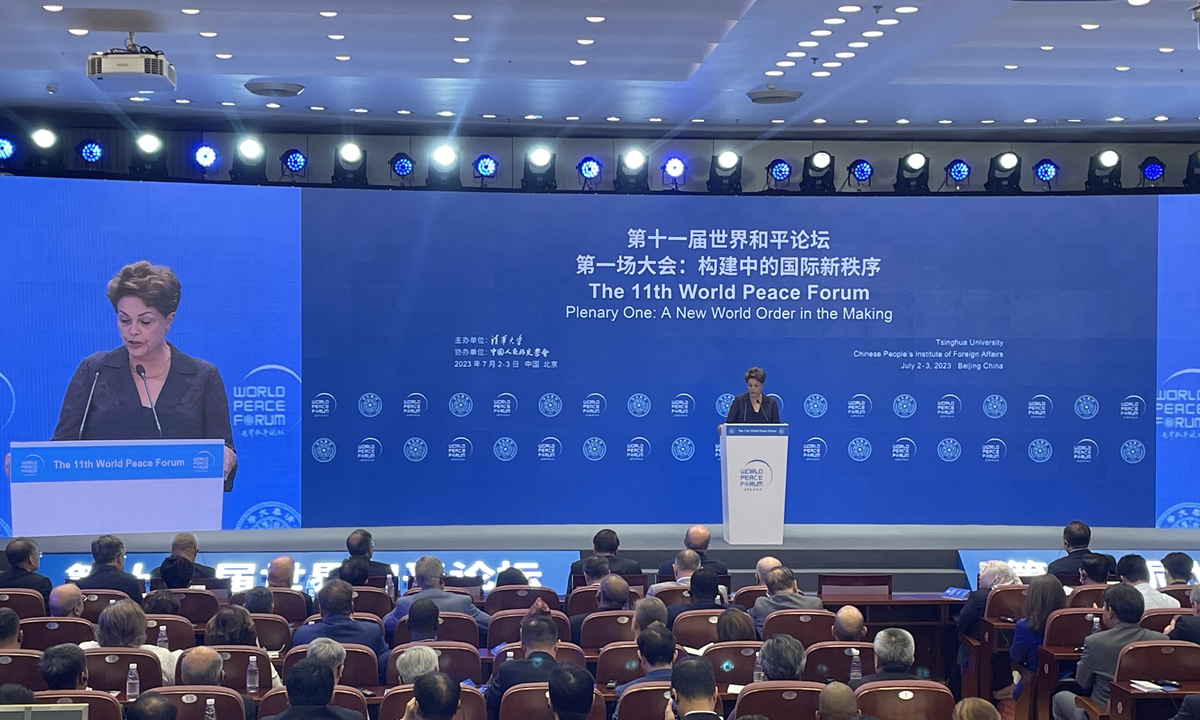
New Development Bank chief and former Brazilian President Dilma Rousseff speaks at 11th World Peace Forum in Beijing on Sunday. Photo: Chen Qingqing/GT
Decoupling and de-risking not only weaken economic globalization and financial relationships, but are also being used as political weapons to prevent the rise of new participants on the international stage. One of the most serious threats in today's world is the new protectionism, the New Development Bank chief and former Brazilian President Dilma Rousseff said at a keynote speech at 11th World Peace Forum in Beijing on Sunday.
The current global macroeconomic situation is in a highly uncertain moment, facing the impact of various issues such as inflation and debt. Under this unsettling situation, the construction and adjustment of politics and institutions has become urgent and necessary, Rousseff said.
We need to seek inclusive and sustainable development, create an environment of common prosperity and peace, and benefit the people of all countries. Without inclusive and sustainable development, there is no peace, and without peace, there is no stability and security, she noted.
"The concept of cooperation and consensus is different from those who try to address issues of civilization development, human rights, and democracy from a forcibly imposed confrontational perspective," Rousseff said, noting that some political models derived from a single country's experience have been elevated to a "universal standard" that have been forcibly implemented.
"If you don't accept this imposed value system, you will be punished accordingly, or face measures such as war, coups, or sanctions," she said, noting that the richness and diversity of human civilization are simply abandoned in this way, and different development paths pursued by different nations are thus ignored.
"Decoupling" and "de-risking" have been buzzwords on the international stage recently. Rousseff believes that the impacts of these concepts not only weakens economic globalization and financial relations, but are also used as political weapons to prevent new participants on the international stage from rising.
"Will globalization end?" Rousseff stated that although the impetus of globalization itself has weakened, it has always created a deep interdependence between economies and different regions of the world, and this interconnection has grown in proportion with the increase in trade, the densification of global value chains, and the doubling of capital flows.
Disconnecting the world has become impractical. Trying to erect insurmountable barriers between nations is tantamount to a return to the 'Iron Curtain' and is out of sync with the times. Under this way of thinking, are countries moving towards camp differentiation, or are they promoting common prosperity? Do they hold a Cold War mentality, or do they adhere to multilateralism? Are they copying the development model of other countries, or are they combining the national conditions of various countries to forge their own path? Are they addressing climate change through effective resource allocation, or are they simply maintaining the status quo? Rousseff posed a series of key questions.
She further pointed out that one of the most serious threats in the world today are linked to new protectionism, such as curbing the development of emerging countries. Rousseff stated outright that the containment policies against China - whether it is unilateral tariff increases or last year's "CHIPS and Science Act," are just moves that shame the WTO or disrupt the global semiconductor industry chain.
In the face of the rifts in globalization, there is a need to seek reform of global governance to break protectionism and unilateralism, the NDB chief said. Therefore, consensus must be sought on the basis of shared prosperity, allowing all countries to benefit from the wealth created globally, while condemning all forms of unipolarity.




